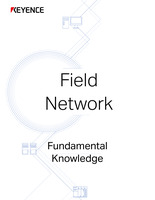CC-Link IE
This section explains CC-Link IE.
Overview
CC-Link IE is an open network developed by the CC-Link Partner Association in 2007. Two variations of CC-Link IE have been released: CC-Link IE Control which was developed as a large-scale controller network, and CC-Link IE Field which was developed as a field network. CC-Link IE Control and CC-Link IE Field cannot be used together.
Wiring Method and Communication Protocol
Wiring method
CC-Link IE Field and CC-Link IE Control are both Gigabit Ethernet-based networks, but there are some differences between them such as the number of connectable stations and functions.
| Network | CC-Link IE Field | CC-Link IE Control |
|---|---|---|
| Cable | STP cable (category 5e) | Multi-mode optical fiber |
| Topology | Line, star, ring | Loop (duplex) |
| Maximum number of connectable stations | 254 | 120 |
| Maximum distance between stations | 100 m (328.1′) | 550 m (1804.5′) |
| Use with Ethernet | Not possible | Not possible |
Communication protocol
CC-Link IE uses the Seamless Message Protocol (SLMP), which is the common communication protocol for the CC-Link Family, with the token passing method. The same protocol is used throughout the network, from the control level to the field network level, which is intended to seamlessly connect host PCs to equipment at manufacturing sites.
Characteristics
CC-Link IE (Control, Field) networks use the token passing method. This network easily controls communication using shared memory areas. CC-Link IE Motion has also been developed to use CC-Link IE with motion networks.
Cyclic communication function
This function automatically exchanges link device data.

Transient transmission function
This transmission method performs one-to-one data communication with a specified station at arbitrary timings.
Motion network
CC-Link IE Motion was developed based on CC-Link IE Field. It simultaneously allows for token passing and motion control synchronization with synchronization timing jitter of 1 μs or less between slaves. Communication with slave stations is performed during periods outside the timing used for motion control synchronization.

A: Control period
B: Synchronous timing
C: Timing synchronized
Related Networks
CC-Link
This is an RS-485 based open network.
- Company, product, and network names mentioned on this page are either trademarks or registered trademarks of their respective companies.
- Note that some information, such as applicable standards and specifications, may have changed since this page was published.
November 2015






